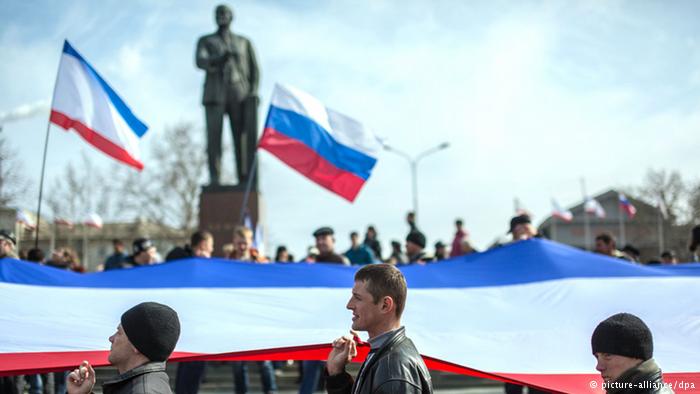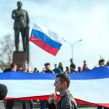
Crimea’s Consequences for Russia’s Non-Russians—A Net Assessment of Long-Term Nationalities Trends Within the Russian Federation Since the Start of 2014
Publication: Eurasia Daily Monitor Volume: 11 Issue: 182
By:

Not surprisingly, most people have focused on the consequences that Moscow’s Anschluss of Crimea has had for the people of that Ukrainian peninsula, for Ukraine, for Russia’s relations with the West and for the international system as a whole. But some of the most serious long-term consequences of Moscow’s illegal annexation of Crimea could potentially affect the non-Russian peoples living within the borders of the Russian Federation. Five such consequential trends have been gradually developing this year and call for further scrutiny.
First of all, Vladimir Putin’s move in Crimea has reopened an issue most had thought closed: the stability of borders both among countries and between them. Moscow’s chief argument against the Chechens and other non-Russian nationalities interested in secession from Russia is that international borders cannot be changed. But now Moscow has changed them, and that action has triggered discussions about what non-Russians might achieve, with various activists drawing maps of a dismembered Russian Federation or speculating on whether the Chinese might move into Siberia as Russians have moved into Ukraine.
Most of these discussions are fanciful, at least for the moment, but they have also triggered concerns about changes in other borders: those within the Russian Federation. Putin’s effort to amalgamate smaller non-Russian units with larger and predominantly Russian ones had stalled; however, there now are growing fears in many non-Russian areas that he may start that process up again, especially because such moves or even more radical ones toward the “gubernization” of Russia, would be extremely popular among Russian nationalists.
Again and again, both non-Russian activists and Russian commentators have pointed to such possibilities as among the most destabilizing consequences of Putin’s opening of the Pandora’s box that is Crimea (colta.ru, February 20; svobodnykaliningrad.com, September 23).
Second, in his effort to justify the Crimean Anschluss, Putin has insisted that Russian ethnicity or, more generally, being part of what he calls “the Russian world” is more important than citizenship. Such a position puts him at odds with the international order, which, since 1945, has been based on the primacy of state citizenship over ethnicity. Moreover, Putin’s view undermines the stability of the Russian Federation itself—a country that formally defines itself as a multi-national state and whose population is one-quarter non-Russian.
From the point of view of many Russians and even more non-Russians, their country is on its way to becoming a Russian nation-state with minorities, rather than a multi-national federation in which no nation is supposed to enjoy pride of place at the expense of others. While Russians may welcome that as “the birth of a nation,” the non-Russians see it as giving carte blanche to increasingly authoritarian Russian officials to strip the non-Russians of their rights and reduce them to the status of second-, third- or even fourth-class citizens.
The first flash point of this new ethnic tension may be already occurring between Russians and Ukrainians. The latter nationality includes both the several million who have long lived in various parts of the Russian Federation, including in the Russian Far East, which Ukrainians call “the Green Wedge,” and the nearly one million refugees escaping the fighting in southeastern Ukraine. This new group’s presence has been imposing unwanted burdens on Russian officials and populations and intensifying anti-Ukrainian attitudes among Russians as well as anti-Russian attitudes among Ukrainians (nazaccent.ru, August 5; centrasia.ru, September 29).
More to the point, or at least with greater implications for new outbreaks of tension and even violence in the future, neither the Russian boosters of this idea nor the non-Russian opponents of it have been shy to talk about these possibilities and these risks (forum-msk.org, October 13).
Third, the absorption of Crimea has had the unintended consequence of pushing the Republic of Tatarstan toward its earlier post-Soviet role as the leader of the non-Russian republics. Following Crimea’s annexation, Moscow assumed that it could use the Volga Tatars as its agents to help absorb the Crimean Tatars. But that plan backfired. Instead of influence flowing from Kazan to Bakhchisaray (former capital of the Crimean Khanate), it has flowed in the opposite direction. Over the past year, Volga Tatars, the second largest nationality in the Russian Federation, have been increasingly taking up the cudgels for the Crimean Tatars. And some Volga Tatars even openly spoke about the way in which the formation of a second Tatar republic in the Russian Federation could open the way for a new effort to promote real federalism in the country (qha.com.ua, November 26, 2013; Window on Eurasia, May 24).
Fourth, the annexation of Crimea has intriguingly created a new language community within Russia, which together forms the sixth largest language group in that country. In a commentary on LiveJournal, for example, Dagestani writer Ruslan Salahbekov points out that the 250,000 Crimean Tatars now part of Russia share essentially the same language with 500,000 Kumyks almost 220,000 Karachai, about 115,000 Balkars, and 100,000 Nogai (salahbekov.livejournal.com, October 10). Their shared spoken language—“a unified system of dialects,” which has four distinctive written norms—will become a lingua franca for these peoples in the future, Salahbekov argues, allowing the ideas of the Crimean Tatars to pass into the other nationalities and further destabilize the situation in the North Caucasus where these other peoples live. Among those who have already been encouraged by this process are the Circassian nationalities who hope to copy the idea of one language, many peoples as they seek to re-energize their national rebirth.
But fifth and perhaps the most dangerous impact of the Crimean Anschluss on the peoples of the Russian Federation is the involvement of an increasing number of Russians and non-Russians on opposite sides in the fighting in southeastern Ukraine that was triggered by the annexation. Not only is the experience of fighting in these areas giving some of those involved new skills in the use of violence, but there is growing evidence that it is radicalizing the feelings that led them to take part in the first place. Russian media outlets are already expressing alarm about what will happen when those who took part in the Donbas fighting return home, newly radicalized and convinced that violence is the only way to achieve their goals. And some in the North Caucasus are worried that the fact that Chechens have fought on both sides could open the way to a new wave of violence there (ng.ru, October 13).
Most of these trends are still below the radar screen or, if taken note of, dismissed as impossibilities. But one would do well to remember that only a year ago the possibility of a Russian annexation of Crimea was treated in exactly the same way.




